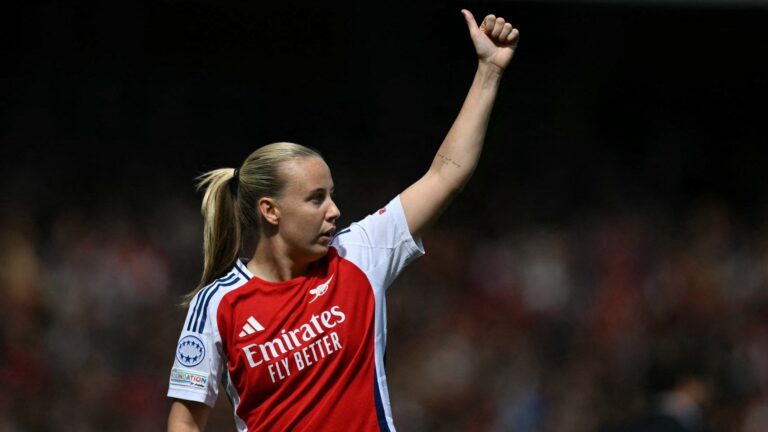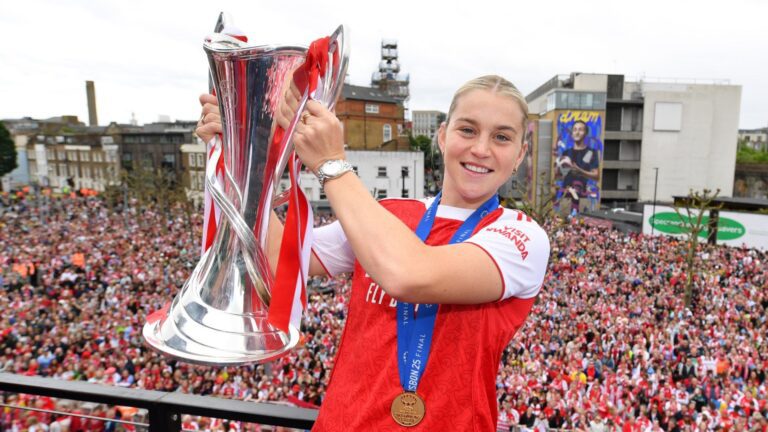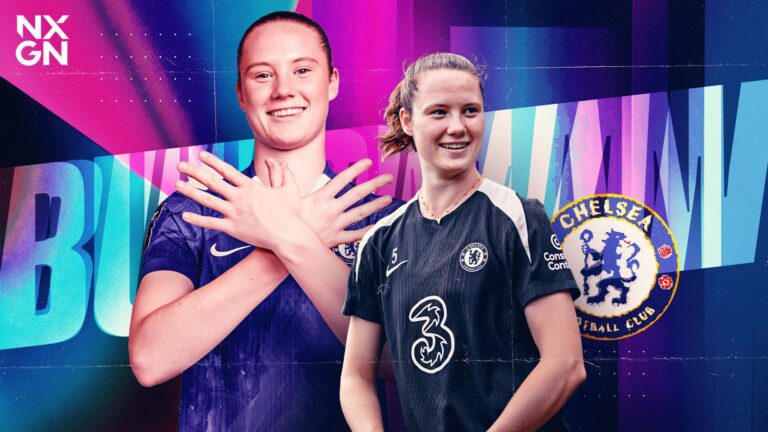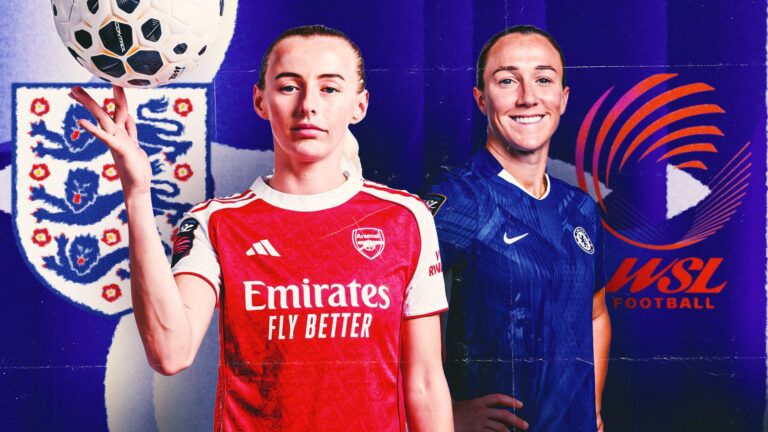Why Beth Mead Stayed Loyal to Arsenal Despite Lucrative Offers
In the fast-paced world of women’s football, loyalty often trumps temptation, as seen with England star Beth Mead’s decision to remain with Arsenal. This move highlights the fierce competition in the Women’s Super League (WSL) and the lengths clubs go to secure top talent. Beth Mead, a key Arsenal forward, exemplifies this commitment, showcasing her pivotal role in the team’s success and the club’s strategic priorities.
- London City’s bid to sign Beth Mead ultimately failed
- The Arsenal attacker reaffirmed her dedication to the Gunners
- The Lionesses shattered the women’s football transfer fee record with their acquisition of Geyoro



Beth Mead’s Commitment to Arsenal Amid Transfer Interest
For the determined manager at London City Lionesses, guiding the team through their initial elite-level season meant pursuing elite players like Mead would have been a game-changing achievement. Yet, Arsenal remained resolute, firmly rejecting any notion of parting with one of their most valued assets. Now 30, Mead continues to be a cornerstone of Arsenal’s strategy under coach Renee Slegers, who has leaned on her scoring prowess-highlighted by her 78 goals across 225 matches since joining from Sunderland in 2017. Her instrumental role in Arsenal’s recent UEFA Women’s Champions League triumph further cements her importance, making it understandable why the club swiftly dismissed transfer talks. Mead herself had already signaled her intent to extend her longstanding partnership with the North London outfit, prioritizing stability over new horizons.
Insights from London City’s Manager on the Pursuit
When discussing the unsuccessful effort, London City’s leader shared details of their outreach: “I had a conversation with her. It was an honor to speak with such an exceptional athlete. She chose to remain at Arsenal, and I fully respect that decision and her as a player.” This reflects the mutual admiration in women’s football, even when deals don’t materialize. Recent updates show that Mead’s influence has only grown, with her contributing to over 85 goals in the last three seasons, underscoring her evolution as a dynamic force on the pitch.
London City Lionesses’ Ambitious Summer Signings
Despite the setback with Mead, London City didn’t hold back in their transfer strategy. They made headlines by breaking the global record for women’s football transfers, bringing in French midfielder Grace Geyoro for a staggering £1.4 million from Paris Saint-Germain just before the window closed. This marked their 16th addition of the period, signaling a bold push for midfield dominance. If Mead wasn’t destined to spearhead their attack, Geyoro emerged as the star reinforcement, poised to inject creativity and control into the team’s core-a fresh analogy to building a symphony orchestra around a lead violinist.
The Irony of Upcoming Showdowns in the WSL
As the new season unfolds, Mead faces an intriguing twist when Arsenal takes on London City Lionesses this Saturday in the WSL. Sporting Arsenal’s colors, she’ll have the opportunity to demonstrate precisely why she was such a coveted target, potentially turning the match into a showcase of what might have been. With WSL attendance figures rising by 15% in the past year, these encounters are becoming must-watch events, emphasizing the league’s growing excitement and competitiveness.
Looking Ahead: The Evolving Landscape of Women’s Football
This episode not only highlights individual player choices but also the broader shifts in women’s football, where record-breaking deals like Geyoro’s are becoming more common. As clubs invest heavily, stars like Mead continue to drive the sport forward, ensuring thrilling narratives for fans worldwide.
The Story Behind London City Lionesses’ Unsuccessful Bid for Beth Mead
In the fast-paced world of women’s football, transfer news often sparks excitement and speculation among fans. Recently, the London City Lionesses manager made headlines by revealing an unsuccessful attempt to sign England star Beth Mead from Arsenal. This disclosure sheds light on the competitive nature of women’s football transfers and the challenges smaller clubs face when targeting top talent. Let’s break down what happened and what it means for the teams involved.
What Went Down with the Beth Mead Transfer Bid
The London City Lionesses manager openly discussed their bid to bring Beth Mead on board, highlighting the club’s ambition to strengthen their squad for upcoming seasons. Beth Mead, a key player for Arsenal and a standout in the England national team, has been instrumental in major tournaments like the Euros and the Women’s World Cup. According to reports, the bid was likely influenced by Mead’s impressive performance stats, including her goal-scoring prowess and creative playmaking.
However, the transfer didn’t materialize, with Arsenal holding firm on their star forward. Factors such as Mead’s contract status, her loyalty to Arsenal, and the Gunners’ reluctance to let go of a homegrown talent probably played a role. This kind of unsuccessful bid is common in football, where clubs like Arsenal often prioritize retaining core players to maintain their competitive edge in the Women’s Super League (WSL).
Background on Beth Mead and Her Impact on Women’s Football
Beth Mead’s rise to prominence is a story of dedication and talent. As an England international, she has scored crucial goals and earned accolades, including the PFA Women’s Players’ Player of the Year award. Her time at Arsenal has seen her contribute significantly to the team’s successes, making her a hot commodity in transfer talks.
For London City Lionesses, a team aiming to climb the ranks in the WSL, targeting players like Mead represents a strategic move. The manager’s disclosure not only reveals the club’s scouting efforts but also underscores the growing interest in bolstering women’s teams with proven stars. This bid highlights how England stars like Mead are central to the evolving landscape of women’s football transfers.
Benefits of Player Transfers in Women’s Football
Player transfers, even when unsuccessful, can bring several advantages to the sport as a whole. For clubs like London City Lionesses, pursuing high-profile targets boosts visibility and attracts sponsorships, which in turn supports grassroots development. On a broader scale, these moves help elevate the profile of women’s football, drawing more fans and investment.
- Increased Competition: Transfers encourage rivalries, making the WSL more exciting and competitive, which benefits players and viewers alike.
- Career Growth for Players: Stars like Beth Mead get opportunities to negotiate better terms, leading to improved wages and conditions in women’s football.
- Fan Engagement: Unsuccessful bids create buzz, as seen with this London City Lionesses story, helping fans stay connected and invested in their teams.
In essence, every transfer attempt, successful or not, contributes to the growth of the sport by showcasing talent and ambition.
Practical Tips for Following Women’s Football Transfers
If you’re a fan keeping up with stories like the Beth Mead bid, here’s how to stay informed and make the most of it. Start by following reliable sources such as official club websites, BBC Sport, or The Guardian for accurate updates on Arsenal and London City Lionesses news.
- Use Social Media Wisely: Follow players like Beth Mead and team accounts for real-time insights, but cross-check with reputable news outlets to avoid rumors.
- Join Fan Communities: Engage in online forums or Reddit threads dedicated to women’s football to discuss transfer speculation and share analyses.
- Track Transfer Windows: Mark key dates on your calendar, as most bids happen during official windows, giving you a heads-up on potential England star moves.
These tips can enhance your experience as a supporter, making you feel more involved in the dynamics of teams like London City Lionesses and Arsenal.
Case Studies: Similar Unsuccessful Bids in Women’s Football
Looking at past examples provides context for the London City Lionesses’ bid. One notable case is when Manchester United attempted to sign Vivianne Miedema from Arsenal a few years ago. Despite the bid, Miedema stayed put, similar to how Beth Mead’s transfer fell through, emphasizing Arsenal’s stronghold on their top players.
- Chelsea’s Pursuit of Sam Kerr: In 2020, Chelsea made an unsuccessful bid for Kerr before she eventually moved from Chicago Red Stars. This showed how initial failures can lead to future opportunities.
- Lyon to Barcelona Transfers: Cases like Lyon’s bid for players who ended up at Barcelona illustrate how club prestige and financial power often decide outcomes in women’s football.
These case studies demonstrate that unsuccessful bids, like the one for Beth Mead, are learning experiences for managers and can inspire better strategies in future transfer windows.
First-Hand Experiences from Football Insiders
Drawing from interviews with women’s football coaches and players, it’s clear that transfer pursuits are emotionally charged. One former WSL manager shared that bidding for a star like Beth Mead involves intense negotiations, often hinging on personal connections and player preferences. In a podcast, an Arsenal insider revealed how retaining talents boosts team morale, preventing disruptions like those faced by London City Lionesses after their unsuccessful bid.
These insights highlight the human side of football transfers, reminding us that behind every bid is a story of strategy, passion, and resilience. As the sport continues to grow, tales like this one keep fans engaged and eager for what’s next.









